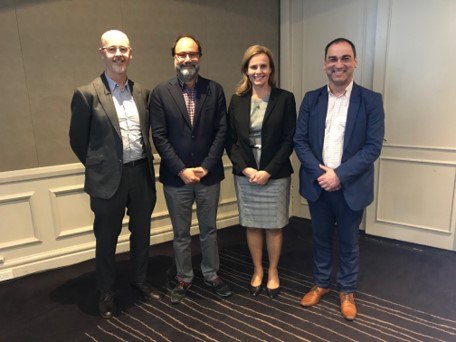Overcoming the Challenges in the Management of Obesity
 Featured in the photograph, left to right: Assoc. Prof Michael Talbot, President of the Australian & New Zealand Metabolic Obesity Surgery Society (ANZMOSS), Prof Arya Sharma, Chair for Obesity Research & Management, University of Alberta Canada, Dr Georgia Rigas, Chair: Royal Australian College of General Practitioners (RACGP) Obesity Management Network, Assoc. Prof Sof Andrikopoulos, Chief Executive Officer, Australian Diabetes Society
Featured in the photograph, left to right: Assoc. Prof Michael Talbot, President of the Australian & New Zealand Metabolic Obesity Surgery Society (ANZMOSS), Prof Arya Sharma, Chair for Obesity Research & Management, University of Alberta Canada, Dr Georgia Rigas, Chair: Royal Australian College of General Practitioners (RACGP) Obesity Management Network, Assoc. Prof Sof Andrikopoulos, Chief Executive Officer, Australian Diabetes Society
The Heterogeneity of Obesity
- Last night, Prof Arya Sharma gave a great talk on “Overcoming the Challenges in the Management of Obesity”.
- One of the key messages he raised which resonated a lot with me is that we probably don’t discuss enough the heterogeneity of obesity. What this means is “that the disease is not the same for everyone”.
- Having being involved with the care of people living with overweight and obesity in one way or another for close to 20 years, it’s something that is clearly evident, but not discussed.
The Heterogeneity of Obesity
- Age of onset: child vs young adult vs middle age adult
- Various drivers: genetics, illness/immobility, medication,stress, environment, food [quality, quantity, availability], physical activity etc
- Adiposity phenotype: apple vs pear body shape
- Health impact: every organ system in the human body can be affected by obesity, however not every person gets every health problem eg diabetes, sore knees, fertility concerns, sleep apnoea etc
- Response to treatment: some people will respond better to medications, others to bariatric surgery, others a combination of both. This should not come as any surprise to us, we see the same in managing people with diabetes, infertility and even cancer….
Take Home Messages
- Despite advanced in medical therapies and technology, when it comes to chronic disease management, we still rely on “trial and error”…… eg Let’s try treatment A:
- If the person responds = fantastic their body and the therapy are working together as we had hoped
- If not, that’s ok, its not the person’s fault, we just need to try treatment B (or C) with a different mechanism of action
- Finally, the “F” word (failure) will not be tolerated when discussing the management of people living with overweight or obesity; there are only responders vs non-responders.











